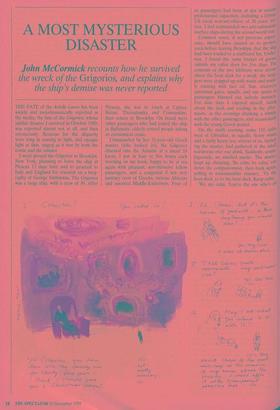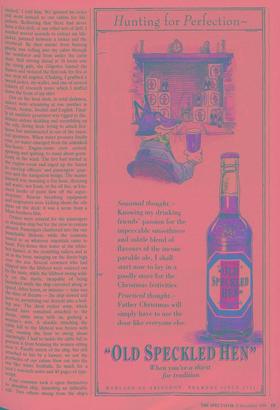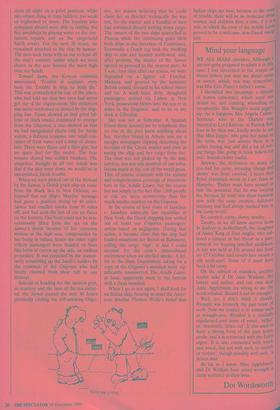A MOST MYSTERIOUS DISASTER
John McCormick recounts how he survived the wreck of the Grigorios, and explains why
the ship's' demise was never reported
THE FATE of the Achille Lauro has been widely and melodramatically reported in the media; the fate of the Grigorios, whose similar disaster I survived in October 1980, was reported almost not at all, and then erroneously. Reasons for the disparity were long in coming to light, and opaque light at that, tinged as it was by both the comic and the sinister.
I went aboard the Grigorios in Brooklyn, New York, planning to leave the ship at Piraeus 13 days later and to proceed to Italy and England for research on a biog- raphy of George Santayana. The Grigorios was a large ship, with a crew of 30. After
Piraeus, she was to touch at Cyprus, Beirut, ThessaIonika and Constantine, then return to Brooklyn. On board were other passengers who had joined the ship at Baltimore, elderly retired people taking an economical cruise.
Commanded by her 31-year-old Greek master (who looked 16), the Grigorios churned into the Atlantic at a smart 16 knots. I put in four or five hours each morning on my book, happy to be at sea again with pleasant, non-intrusive fellow passengers, and a congenial if not very sanitary crew of Greeks, various Africans and assorted Middle-Easterners. Four of us passengers had been at sea in various professional capacities, including a former US naval warrant-officer of 30 years' ser- vice. I had commanded two anti-submarine warfare ships during the second world war: Common sense, if not previous experi- ence, should have caused us to protest, even before leaving Brooklyn, that the ship had been loaded to a starboard list. Under- way, I found the same bucket of grease outside my cabin door for five days. The contents of the two lifeboats were strewn about the boat deck for a week; the scup- pers were stopped up with waste and usual- ly running with fuel oil. Sun, recurrent autumnal gales, squalls, and our status as passengers blunted our sailorly instincts. For nine days I enjoyed myself, lazing about the deck and reading in the after- noons, in the evenings drinking a whisk)' with the other passengers, and occasionailY with the young Greek master.
On the ninth evening, some 150 Miles west of Gibraltar, in squalls, heavy winds and a fairly heavy sea, several of us, includ- ing the master, had gathered in the small wardroom over our drink. Suddenly, unam- biguously, we smelled smoke. The master leapt up, shouting, 'Be calm, be calm,' rail down the companionway, then back again, yelling in unseamanlike manner, 'To the boat deck, to to the boat deck. Keep calm.
'We are calm. You're the one who's
excited,' I told him. We ignored his order and went instead to our cabins for life- jackets. Reflecting that there had never been a fire-drill, or any other sort of drill, I needed several seconds to extract my life- jacket, jammed between a locker and the overhead. By then smoke from burning Plastic was rolling into my cabin through the ventilator and from under the cabin door. Still driving ahead at 16 knots into .the rising gale, the Grigorios fanned the flames and violated the first rule for fire at sea: stop all engines. Choking, I grabbed a tweed jacket, my wallet, and one of several folders of research notes which I stuffed down the front of my shirt. Out on the boat deck, in total darkness, sailors were screaming at one another in Greek, Arabic, Swahili and English. Final- ly an auxiliary generator was rigged to illu- minate sailors skidding and scrambling on the oily, listing deck, trying to attach fire- hoses but uninstructed in use of the essen- tial spanners. When water pressure finally rose, no water emerged from the unkinked flre-hoses. Engine-room crew arrived, sPewing and spitting, to stand about gorm- lessly in the wind. The fire had started in the engine-room and raged up the funnel to envelop officers' and passengers' quar- ters and the navigation bridge. The master himself was manning a fire-hose, directing salt water, not foam, at the oil fire, as kite- sized hunks of paint flew off the super- structure. Rescue breathing equipment and respirators were kicking about the oily mess on the deck: it was a scene from a Marx brothers film. Orders were relayed for the passengers to abandon ship but for the crew to remain aboard. Passengers clambered into the one launchable lifeboat, while the coxswain tossed to us whatever essentials came to hand. Fire-hoses shot water at the white- hot funnel, at the trembling sailors and at us In the boat, swinging on the davits high OVer the sea. Several crewmen who had sllPped into the lifeboat were ordered out 13Y, the mate, while the lifeboat swung wild- ly on the davits, incapable of being launched while the ship careened along at speed. After hours, or minutes — time was the time of dreams — the ship slowed and hove to, permitting our descent into a boil- ing sea. The davit rocker arms, which should have remained attached to the davits, came away with us, gashing a woman's arm. A shackle attaching the cable fall to the lifeboat was frozen with rust, causing the boat to swing about alarmingly; I had to tackle the cable fall to prevent it from braining the women sitting near it. Finally astern of the ship, but still attached to her by a hawser, we saw the Portholes of our cabins blow out into the sea like white footballs. So much for a Year's research notes and 40 pages of type- script.
Four crewmen took it upon themselves to abandon ship, launching an inflatable raft. Two others swung from the ship's
stern all night on a paint pontoon, while two others clung to rope ladders, too weak or frightened to move. The loyalists who remained aboard were able to confine the fire amidships by playing water on the con- tainers topside and on the cargo-hold hatch covers. For the next 20 hours, we remained attached to the ship by hawser. The men took turns with an oar to fend off the ship's counter, under which we were drawn as the seas heaved the stern high over our heads.
Toward dawn, the Kenyan coxswain announced, `Trouble in airplane, every body die. Trouble in ship, no body die.' This was contradicted by one of the oilers, who had told me that two men had never got out of the engine-room. His statement was never confirmed or denied by the ship- ping line. Dawn showed us that great bil- lows of black smoke continued to emerge from the Grigorios; it also showed us that we had navigational charts only for Arctic waters, a dubious compass, one small con- tainer of fresh water and a lump of choco- late. There were flares and a flare gun, but no spare fuel for the motor. The four women shared two sodden blankets. The unspoken thought in all our minds was that if the ship went down, we would be in unvarnished, bleak trouble.
When we were picked out of the lifeboat by the Samos, a Greek grain ship en route from the Black Sea to New Orleans, we learned that our ship's 'Mayday' message had given a position wrong by 40 miles. Samos had smelled smoke from 30 miles off, and had seen the last of our six flares on the horizon. Our boat could not be con- ventionally lifted from the sea on the Samos's davits because of her excessive motion in the high seas, compounded by her being in ballast, hence the other eight elderly passengers were hoisted on lines like bales of cotton up the side, an endless procedure. It was preceded by the unman- nerly scrambling up the Jacob's ladders by the crewmen of the Grigorios who had finally climbed from their raft to our lifeboat.
Instead of heading for the nearest port, as courtesy and the laws of the sea dictat- ed, the Samos passed the next 48 hours piratically circling the still-smoking Grigo- rios, her master believing that he could claim her as derelict: technically she was not, for the master and a handful of men had remained aboard wetting down cargo. The owners of the two ships quarrelled in Piraeus while the continuing gales blew both ships in the direction of Casablanca. Eventually a Dutch tug took the smoking ship in tow and headed north-west, and, after protests, the master of the Samos agreed to proceed to the nearest port. At 3 a.m., four days after our rescue, we were deposited on a lighter off Funchal, Madeira, and greeted by the honorary British consul, dressed in his school blazer and tie. A week later, dirty, thoughtful passengers arrived via Lisbon in New York, possessions blown into the sea or in ashes in the Grigorios, said to be in dry dock at Gibraltar.
She was not at Gibraltar. A Spanish friend there assured me by telephone that no one in the port knew anything about her. Another friend in Athens sent me a meagre newspaper clipping describing the heroism of the Greek master and crew in saving the ship and her cargo from fire. The item was not picked up by the wire services, nor was any mention of our tribu- lations made in the rest of the world press. This, of course, contrasts with the minute and comprehensive coverage of misadven- ture in the Achille Lauro; but the reason lies not simply in the fact that 1,000 people at risk are more newsworthy than the much smaller number on the Grigorios.
In the course of four years of Jarndyce v. Jarndyce admiralty law squabbles in New York, the Greek shipping line settled out of court our Grigorios passengers' action based on negligence. During that action, it became clear that the ship had loaded munitions for Beirut at Baltimore, calling the cargo 'rags', at last I could account for the crew's extraordinary excitement when we smelled smoke. A let- ter to the State Department asking for a copy of the Grigorios's manifest went, sig- nificantly, unanswered. The Achille Lauro, at least, apparently went to the bottom with a clean manifest.
When I go to sea again, I shall look for an Italian ship, bearing in mind the Amer- ican novelist Thomas Wolfe's belief that
'Give me a ring.' Italian ships are best, because in the event of trouble there will be no nonsense about women and children first: a rule, if it is a rule, to which the crew of the Achille Lauro proved to be a welcome, non-Greek excep- tion.




































































 Previous page
Previous page